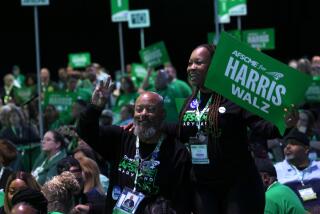Poll Finds Voters Have Doubts About Both Parties
- Share via
WASHINGTON — The American electorate, profoundly ambivalent about both major parties, appears to favor Democratic positions on many key issues but strongly doubts that either party has “the foresight to deal with America’s future in the next 20 to 30 years,” a poll released Friday shows.
“The Democratic agenda is basically being accepted,” said Democratic pollster William Hamilton, who conducted the survey. But, Hamilton said, agreement on issues has yet to translate into increased votes for the party.
Backing May Be Easing
The survey indicates also that support for the anti-Sandinista rebels in Nicaragua already may have begun to fade now that Lt. Col. Oliver L. North is no longer testifying in the congressional Iran- contra hearings.
Hamilton’s survey, completed July 19, a week after North’s testimony ended, found that voters oppose contra aid 51% to 38%. Polls conducted during North’s testimony, including a Los Angeles Times Poll, found supporters and opponents of aid equally divided.
When respondents were asked which party best demonstrated foresight, Democrats and Republicans ran even, each with about 25%. That was a gain for the Democrats, up from 18% a year ago, and a drop of an equal amount for Republicans. More than half, 52%, either had no opinion of which party was better or said neither could handle future problems.
Two health-related issues--AIDS and the ability of Medicare to cope with the needs of the elderly--showed up as the future problems that most troubled voters in the poll, which was conducted for the American Medical Assn.
The Democratic Party did better on questions about specific issues, with substantial majorities saying that it was better able to help the poor, preserve Social Security, limit the arms race and protect the middle class. Democrats have also cut into Republican strength as the party best able to keep government spending reasonable and handle national defense.
Republicans gained on ability to keep taxes fair and control of inflation.
In addition, the public, 36% to 23%, now appears to accept the Democratic argument that the budget deficit is more the fault of President Reagan than Congress. But voters rejected, 49% to 38%, the Democrats’ contention that they have “reduced the deficit significantly” since regaining the Senate in the last election.
Party Identity Little Changed
Party identification, however, has changed little in the last three years, according to Hamilton’s poll. More voters identify with Democrats than Republicans, 37% to 28%, but both parties’ support is soft.
A substantial percentage of voters call themselves either Democrats or Republicans sometimes but independents at other times.
The survey was conducted by phone among 1,200 registered voters and has a margin of error of 3% either way.
More to Read
Get the L.A. Times Politics newsletter
Deeply reported insights into legislation, politics and policy from Sacramento, Washington and beyond. In your inbox twice per week.
You may occasionally receive promotional content from the Los Angeles Times.










